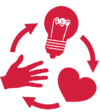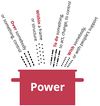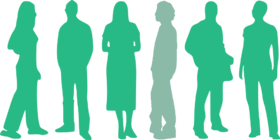Competendo's focus is set on shaping and strengthening key competences of indidviduals. These support individuals in applying learning outcome in their life as active citizens and changemakers. We define learning outcome wider than knowledge, including the practical skills of learners and their attitudes. In the whole these competences allow people to act in complex social situations.
Competence centered learning processes cover the broad range of skills, knowledge and attitudes, which one needs for successful action in a modern society. They help inidviduals to develop their key competences and an active attitude to the idea of life-long learning.
The fundamental
didactical approach we promote is the idea of
empowerment - helping each individual to act self-responsible, purposeful and powerful. Equip individuals with skills, knowledge and competences for feeling, using and sharing their influence and power as self-responsible individuals.
Theoretical aspects of learning and groups
Following the idea of competence based learning and empowerment we need to reflect the learning conditions in classes, seminar rooms, civil society groups and jobs. Since social life is shaped through group and intergroup collaboration, we need to reflect the specifics of social groups as collective spaces for involvement and as learning spaces. This starts with a new understanding of the role of a teacher or trainer as a
facilitator.
Experiential learning sees learning as a process of individual development, holistic in a sense as it appreciates knowledge, skills and attitudes of learners as relevant. It combines learning opportunities in everyday life, school, and all activities beyond classrooms in the civil society.
Personal cooperation is a management instrument and a learning opportunity for enhancing soft skills. The more diverse groups are, they need to reflect and to apply cooperation models or ways of decisionmaking. These necessary reflections include a more detailed understanding of group processes and team roles.
Communication skills lead in the best case to understanding, efficiency or appreciation of the involved communication partners. This section introduces models that illustrate conditions for successful communication and offer models for gaining communicative competence.
The capacity to conflict resolution influences the quality of collaboration and cooperation in the group in a positive way. With conflict management we improve the quality and efficiency of communication and equip our participants with conflict management skills.
Definitions & Terminology
Introduction: On this page we collect links to external glossaries and sources.



